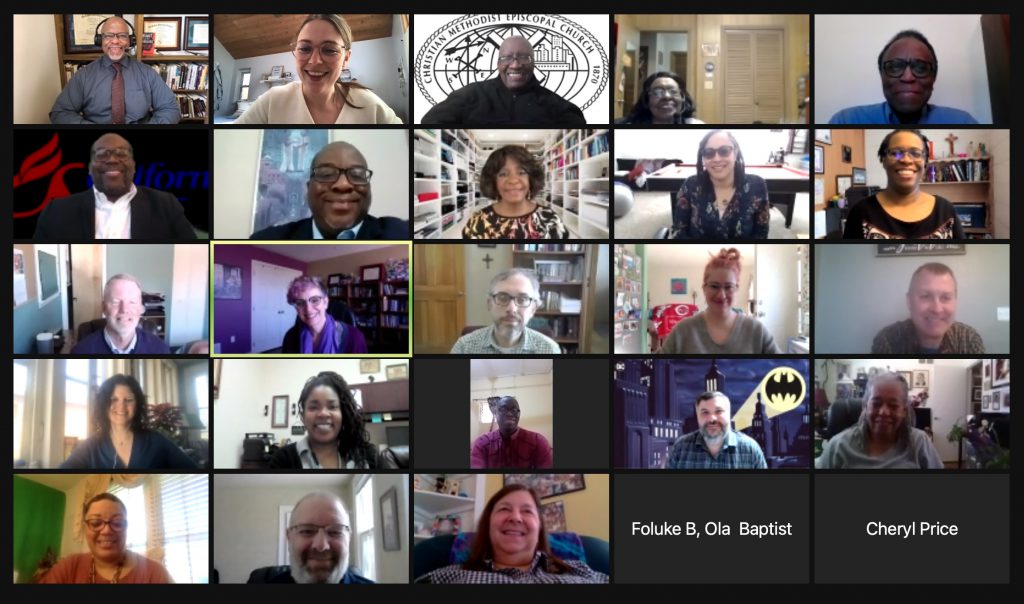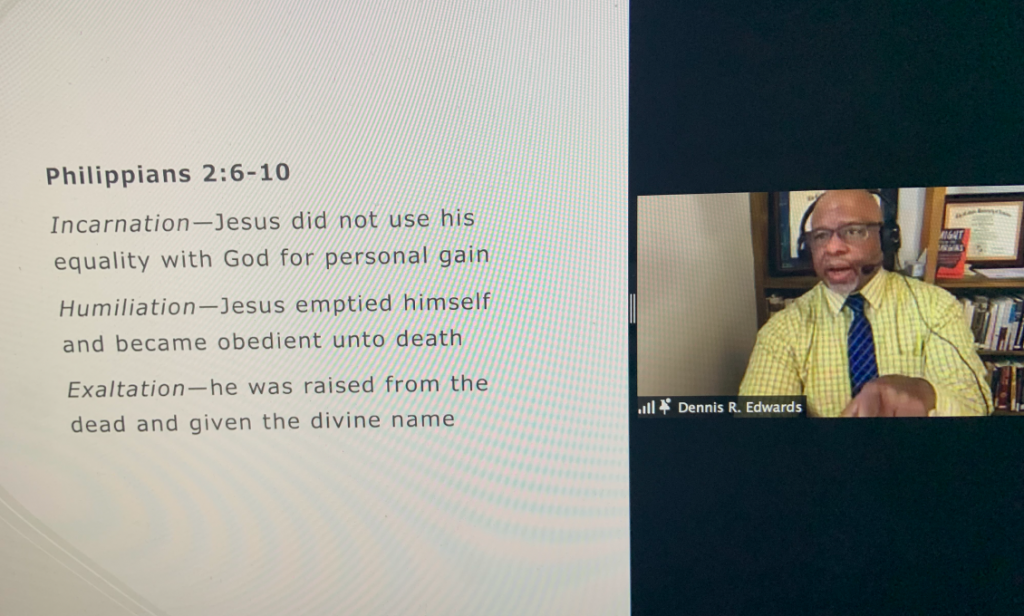
The Committee on the Uniform Lessons Series (CUS) held its annual meeting, March 2-3, 2021.
Typically, representatives of the 25 denominational and publishing partners of the CUS gather in person to make business decisions, review and vote to approve previous work on the Guide to Lessons and Home Daily Bible Readings, write and collaborate on new curriculum outlines, as well as worship and fellowship together. This year, the 30 registered participants signed on to Zoom from time zones across the US and Puerto Rico and from as far away as Nigeria. They were able to enjoy worship and work in the Zoom format, however, they missed seeing each other in-person.
“There are bonds of friendship forged over the many years of working together on CUS—in some cases we’re talking 10 or 20 or more years of annual meetings. For the most part, the technology allowed us to accomplish much of what we would normally do at an annual meeting, but we’re like a family, and it was disappointing not to be together, meeting face-to-face,” says the Rev. Dr. Tammy Wiens, Director of Christian Education and Faith Formation for the National Council of Churches, USA (NCC).
Those who gathered this past week can proudly trace the first Uniform Lesson Outlines to 1872 when the International Sunday School Association wrote their first plan to systematically study the Bible.
Last week’s conference opened with a liturgy led by Rev. Garland F. Pierce, Chair of the CUS and Executive Director of the Department of Christian Education of the African Methodist Episcopal Church (AME).
During this time, participants remembered members who recently passed into the Kingdom Triumphant including Dr. Helen Scott Carter, Rev. Kenneth James, both of the African Methodist Episcopal Zion Church, and Dr. Melvin E. Banks, Founder of Urban Ministries, Inc.
Following the memorial, Pierce reflected on Jesus clearing the Temple courts in John 2:13-22. Jesus’ anger was inspired by the exclusion that was happening in God’s house, he explained. The money changers’ tables and the marketplace left little room for true worship. And Jesus’ life was about making room for all.
As followers of Christ, as Christian educators, making room is also the goal of the CUS. “So let us make room. Let us create space where callings can be remembered, where folks can see that they are fearfully and wonderfully made, no matter what others say. Let’s make room. Let’s create discernment space so that all can make sense of their lives. Let’s make room to disrupt the unjust. Let’s make room,” Pierce concluded.
This opening reflection set the tone for the conference’s focus on elevating and exegeting Scripture in service of the spiritual care and faith formation of learners across the life-span.
Rev. Dr. Dennis Edwards, associate professor of New Testament at North Park University, supported the conference objectives with his two lectures “Core Beliefs of the Christian Faith” and “Social Teachings of the Bible.” These lecture titles were drawn from lesson outlines that the 2021 conference participants will use for their upcoming writing assignments. There is an added historical element to this year’s assignment in that these same texts are included in the 1929-30 CUS outlines. This is one of the ways that CUS has chosen to recognize its upcoming sesquicentennial anniversary. In considering “core beliefs” and “social issues” that faithful Christians confronted in the early 1900’s, the 2021 conference participants give fresh consideration for how the Church is bringing Christ to bear in their own day and time.

Edwards offered his insights to guide CUS in this year’s charge. One of the salient points in his teaching was the central role of hospitality in the biblical witness. In Greek, hospitality (φιλοξενια/philoxenia) is a compound word combining “friend” (φιλος/philos) and “stranger” (χενος/xenos). Edwards lifted up the way in which God’s word invites people of faith to put hospitality into practice, loving flesh and blood neighbors, strangers, and enemies in practical ways. To make this love abstract is to miss the point of hospitality.
Substantial business was also conducted at this year’s meeting, including the vote to approve the six-year proposed outline for Cycle 25 (Fall 2026 through Summer 2032). The cycle theme, “We Have A Story to Tell,” was inspired by the keynote address of last year’s annual conference by the Rev. Dr. Leslie Copeland-Tune, COO of the National Council of Churches, USA.
The Reverend Dr. La Verne Tolbert, chair of the Scope and Sequence Committee tasked with developing Cycle 25 and Vice President, Editorial of Urban Ministries, Inc., explains, “Rather than imposing themes on the texts, Cycle 25 lets the Bible speak through the characters, circumstances, setting and events of the Old and New Testaments.”
The typical conference, which takes place over 5 days, was compressed for two half-day online meetings. Even in the virtual environment, CUS members remain focused on the larger purpose of the committee. As Wiens puts it, “in this year’s meeting we were writing teaching strategies to engage learners about the Christian obligation to God, family, neighbor, community, and world. By virtue of our collaborative process and the relationships we are building with one another we put this conviction of faith into practice. We extend hospitality to our colleagues with love and respect for our differences across theology, ethnicity, nationality, gender, and ecclesial status—to name a few! CUS is the embodiment of Christian faith.”
Developing curriculum outlines for the study of the Bible has been the work of the CUS for 149 years. While they look forward to celebrating the committee’s 150th anniversary next year, they continue to trust all that the Holy Spirit accomplishes in their midst—whether in person or in cyberspace. The Uniform Lessons stand as a witness to their unity in Christ, and their commitment both to bring and to teach Christ’s countercultural message in a broken world.
